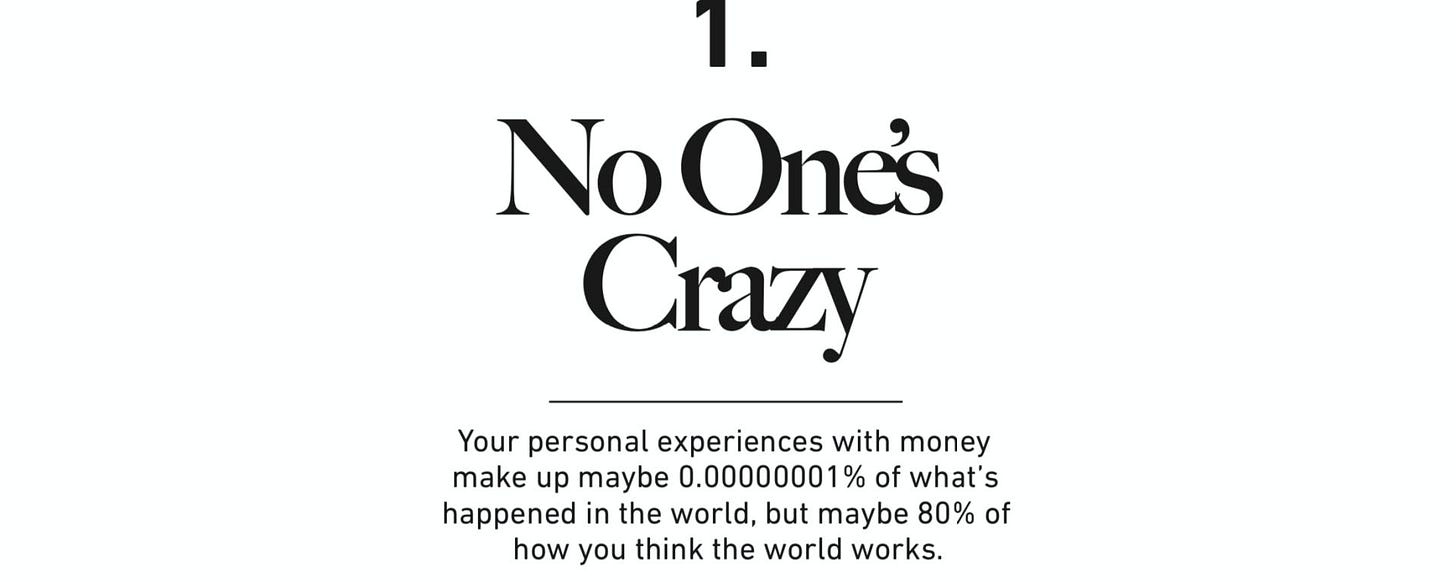No One's Crazy
Do what works best for you
If you haven’t read Morgan Housel’s Psychology of Money, I strongly recommend that as your next book. If you think reading this website is going to remotely benefit you, wait till you read that book - you will be blown away. I have been conscious about my money all my adult life and yet the insights from the book were truly novel and insightful.
The first chapter in that book is “No one is crazy” and it has a line that says “People do some crazy things with money. But no one is crazy”. Rest of this post is going to explore a few thoughts along the same lines.
When I was younger, I used to have judgmental views, both complementary and derisory, about others’ money choices, especially those whose decision making were different from my rubric for financial decision making. Yet, with maturity, I have come to realise that people’s financial decisions are very often a result of their own experiences, family upbringing and biases than about arguments we can make about good or bad choices.
Let me take a few examples:
Someone brought up in a family that made tons of money in real estate is bound to think that real estate is the best way to make money. I know a few families like this.
Someone who lost a lot of money investing in growth stocks is likely to be put off from growth stocks for a very long time. I know of a few people like this (specially from the last 2-3 years of investing)
Someone whose first year or two in equity markets is spent being under water is likely to swear off investing in equity markets. I know of at least one colleague who is going through this presently.
Someone who made a lot of money initially on Crypto is likely to continue to chase the asset class for a very long time. I know of a dear ex-colleague who has gone through this experience.
(OR like me) someone who has had some success with equity is bound to believe that’s the best thing to keep doing forever.
What I am going for is that the word “Personal” in Personal Finance specifically denotes the fact that this aspect of each person’s life is deeply personal to them. Each person’s approach to money - how much they want to earn, how much they want to save, how they wish to invest, how much they want to think etc, are all a product of some combination of nature (their own personality and biases) and nurture (their upbringing and personal experiences). And that’s perfectly fine. There is no one right way to get to your financial goals. They are multiple perfectly good ways to get there. Choose the path that gets *you* there.
Therefore no judgements. At least not from me. I am happy to have a chat about investing with anyone, and offer my pros and cons about any investment / asset class / opportunity. I am also happy to share my own reasoning for investing (as I do regularly on this blog) and challenge others with questions. Beyond that, however, is individual choice. I respect that.
Having given my broad strokes viewpoint, here are some suggestions on how to keep yourself honest in this journey:
Invert, always Invert. Always take your best case scenarios and invert them. Proactively look for blindspots. What happens when the worst case scenarios play out? Are you happy with the situation? If not, time to rethink your plans.
Be objective and use data. Given that we all have our biases, the best we can do to keep them in check is to use data and be objective. Don’t assume that your property is now going to be valued at X - go and see data of transactions with affinity. Don’t assume that you “are beating the market”, put it into a spreadsheet and run some calculations. Our biases are likely going to spill into methodologies too as we are often seeking validation and might use a data methodology that fits our biases. In such cases, use the point #1 - Invert - think what would happen if you used a different metric and see what happens.
Seek the opposite view. Listen to people who talk of approaches that are significant different from yours and see what you can learn from them. Then be open minded enough to bring good ideas from outside to your own financial planning.
One last point on this before I sign off. If anything I say here overwhelms you, or if you think you don’t have a cogent financial plan, or if you feel that your current plan isn’t working, seek help. The best course is to find a fee-only financial advisor and work with them. (Here is a suggested article on the topic) Your future self will thank you for doing so.
As always happy investing!




